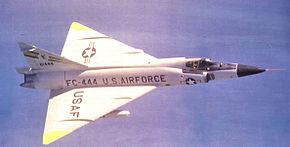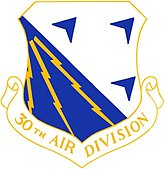30th Air Division
30th Air Division
 | |
|---|---|
 | |
| Active | 1948–1968 |
| Country | |
| Branch | |
| Role | Command of air defense forces |
| Part of | Air Defense Command |
| Decorations | Air Force Outstanding Unit Award |
| Insignia | |
| 30th Air Division emblem (Approved 7 October 1954)[2] |  |


The 30th Air Division (30th AD) is an inactive United States Air Force organization. Its last assignment was with Air Defense Command, assigned to Tenth Air Force, being stationed at Sioux City Municipal Airport, Iowa. It was inactivated on 18 September 1968.
History
[edit]Assigned to Air Defense Command (ADC) for most of its existence, the division's initial mission was the air defense of the upper Great Lakes region of the United States. The 30th equipped, administered, trained, and provided operationally ready forces to the appropriate commanders for air defense. The division trained attached and assigned units and supervised and participated in numerous exercises such as Kiowa Knife and Mandan Indian.[2]
Moved to Sioux City Municipal Airport in 1966 as part of an ADC reorganization and became responsible for air defense in a large area of the upper Midwest after the inactivation of the Sioux City Air Defense Sector. Assumed additional designation of 30th NORAD Region after activation of the NORAD Combat Operations Center at the Cheyenne Mountain Complex, Colorado, and reporting was transferred to NORAD from ADC at Ent Air Force Base in April 1966.
The 30th administered and trained subordinate units, and participated in numerous air defense training exercises.[2] In addition, during the 1960s it supervised training of Air National Guard units with a pertinent mobilization assignment.
Inactivated in September 1968[2] as ADC phased down its interceptor mission as the chances of a Soviet bomber attack on the United States seemed remote, its mission being consolidated into North American Aerospace Defense Command (NORAD) and its assets transferred to 24th NORAD Region/Air Division.
Lineage
[edit]- Established as the 30 Air Division (Defense) on 8 November 1949
- Activated on 16 December 1949
- Inactivated on 1 February 1952
- Organized on 1 February 1952
- Redesignated 30 Air Division (SAGE) on 1 April 1959
- Discontinued and inactivated on 18 September 1968[2]
Assignments
[edit]- Tenth Air Force, 16 December 1949 (attached to Eastern Air Defense Force after 1 January 1951)
- Eastern Air Defense Force, 1 September 1950 – 1 July 1959
- Air Defense Command, 1 July 1959
- Tenth Air Force, 1 April 1966 – 18 September 1968[2]
Stations
[edit]- Selfridge Air Force Base, Michigan – 16 December 1949 – 7 April 1952
- Willow Run Airport (later Willow Run Air Force Station), Michigan, 7 April 1952
- Truax Field, Wisconsin, 1 April 1959
- Sioux City Municipal Airport, Iowa, 1 April 1966 – 18 September 1968[2]
Components
[edit]Division
[edit]- 31st Air Division (attached): 27 November 1950 – 1 February 1951[2]
Sectors
[edit]
|
|
Wings
[edit]
|
|
Groups
[edit]
|
|
Interceptor Squadrons
[edit]
|
|
Missile Squadron
[edit]- 37th Air Defense Missile Squadron (BOMARC): 1 March – 1 April 1960[2]
- Kincheloe Air Force Base, Michigan
Radar Squadrons
[edit]
|
|
See also
[edit]- List of United States Air Force Aerospace Defense Command Interceptor Squadrons
- List of United States Air Force air divisions
- United States general surveillance radar stations
References
[edit]Notes
[edit]Bibliography
[edit]![]() This article incorporates public domain material from the Air Force Historical Research Agency
This article incorporates public domain material from the Air Force Historical Research Agency
- Cornett, Lloyd H; Johnson, Mildred W (1980). A Handbook of Aerospace Defense Organization, 1946–1980 (PDF). Peterson AFB, CO: Office of History, Aerospace Defense Center. Archived from the original (PDF) on 13 February 2016. Retrieved 23 March 2012.
- Winkler, David F.; Webster, Julie L (1997). Searching the skies: The legacy of the United States Cold War Defense Radar Program. Champaign, IL: US Army Construction Engineering Research Laboratories. LCCN 97020912.[dead link]
- "ADCOM's Fighter Interceptor Squadrons". The Interceptor (January 1979) Aerospace Defense Command, (Volume 21, Number 1)

